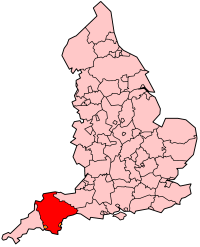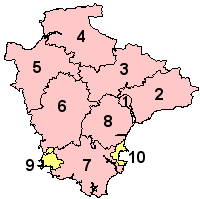Devon

Devon is the short name for Devonshire, a county of England. It is in the southwest of the country. Devon is the second largest county in England, and has the longest road network of any county in England.
History
After the last ice age, Devon was one of the first places in England where people started to live. Archaelogists have found many old places in Devon with ancient buildings. For example, many ruins of old buildings have been found on an area called "Dartmoor", which is now a National Park.
Devon gets its name from the Dumnonii, a name which the invading Romans gave to the Celtic tribe in that area. The Romans invaded Devon about AD 50. The name Dumnonii means "a person who lives in a deep valley", and it comes from the hills and valleys of the area. The Roman army stayed in Devon for about 25 years. Their base was in the city of Exeter.
It was a long time before anyone else invaded Devon. Saxons came to Devon in the 7th Century, and the King of Wessex attacked in 614. There was a big war between Devon and Wessex for 100 years. Some historians think that Wessex won the war by about 715. In 805, Devon became a part of Wessex, but the Kings of Devon still had some power.
A person living at the time called William of Malmesbury said that in Exeter both Britons and Saxons were equal. But there is also an account of King Athelstan of Wessex expelling the Britons from Exeter. The towns and villages of Devon generally have names of Anglo-Saxon (Old English) origin, but some include elements that were borrowed into English from the Brythonic (Celtic) language for example the ending "-combe" (like Ilfracombe), which is similar to the Welsh (language) "cwm". Another example is "tor", which is related to the Welsh "twr". But there are virtually no Celtic place names in Devon of the type found in Cornwall.
Starting in the 9th Century, groups of Viking raiders tried to invade Devon. This continued until the Norman Conquest. The name of Lundy Island comes from the Viking language, which was called Norse. The Vikings are remembered for moving the cathedral from Crediton to Exeter.
Devon has been involved in most of the civil conflicts in England since 1066:
- During the Norman Conquest of England, Exeter was surrounded by William the Conqueror's army for 18 days.
- In 1140, the towns of Exeter and Plympton were both defended against King Stephen.
- There were small battles in Devon during the Wars of the Roses.
- The army of Perkin Warbeck surrounded and attacked Exeter in 1497.
- The Prayer Book Rebellion of 1549.
- The towns of Exeter and Dartmouth were both besieged (surrounded by the enemy) during the English Civil War.
- When William of Orange invaded Britain in 1688 (the Glorious Revolution), he landed at Brixham.
There are many famous (well known) people from Devon, especially seamen. For example, Sir Francis Drake, Gilbert, Sir Richard Grenville and Sir Walter Raleigh all come from Devon. Many other famous people were also born in Devon: for example, the author Agatha Christie was born in the town of Torquay.
Flag

Devon has its own flag. It is linked to St Petroc, who is a local saint with links to Devon and nearby counties. The flag was chosen after winning a competition on the BBC Devon website in 2003.
Economy
Devon is less wealthy than many parts of England, for example the south east. This is because the traditional industries of Devon, for example fishing, mining and farming are declining. The European Union has given parts of Devon help (Objective 2). For example grants of money have been given to help new industries grow. Tourism has become more important recently as a part of the economy of Devon.
An epidemic of Foot and Mouth disease in 2001 led to many farmers losing their cattle, so they lost a lot of money. Other industries also lost a lot of income because of this.
Politics
The main city of Devon is Exeter. This is where the county council is based. The county of Devon is split up into districts. Each district is run by a district council. Some things are the job of the county council and others are the job of the district council. There are also smaller town and parish councils inside the districts.
Plymouth and Torbay are not run by the county council, but have their own special councils. These councils do the jobs of both a county and a district council. These type of areas are called unitary authorities.
Districts in Devon

The numbers on the map are linked to the numbers below.
- Exeter
- East Devon
- Mid Devon
- North Devon
- Torridge
- West Devon
- South Hams
- Teignbridge
- Plymouth (Unitary)
- Torbay (Unitary)
Members of Parliament
- Ben Bradshaw
- Angela Browning
- Geoffrey Cox
- Linda Gilroy
- Nick Harvey
- Adrian Sanders
- Alison Seabeck
- Anthony Steen
- Gary Streeter
- Hugo Swire
- Richard Younger-Ross
Cities, towns and villages

This is a list of the main towns and cities of Devon:
Interesting places
Rivers
- River Avon
- River Axe
- River Dart
- River Erme
- River Exe
- River Otter
- River Tamar (the border between Devon and Cornwall)
- River Tavy
- River Taw
- River Teign
- River Torridge
External links
Note: The links below are not in simple English.
